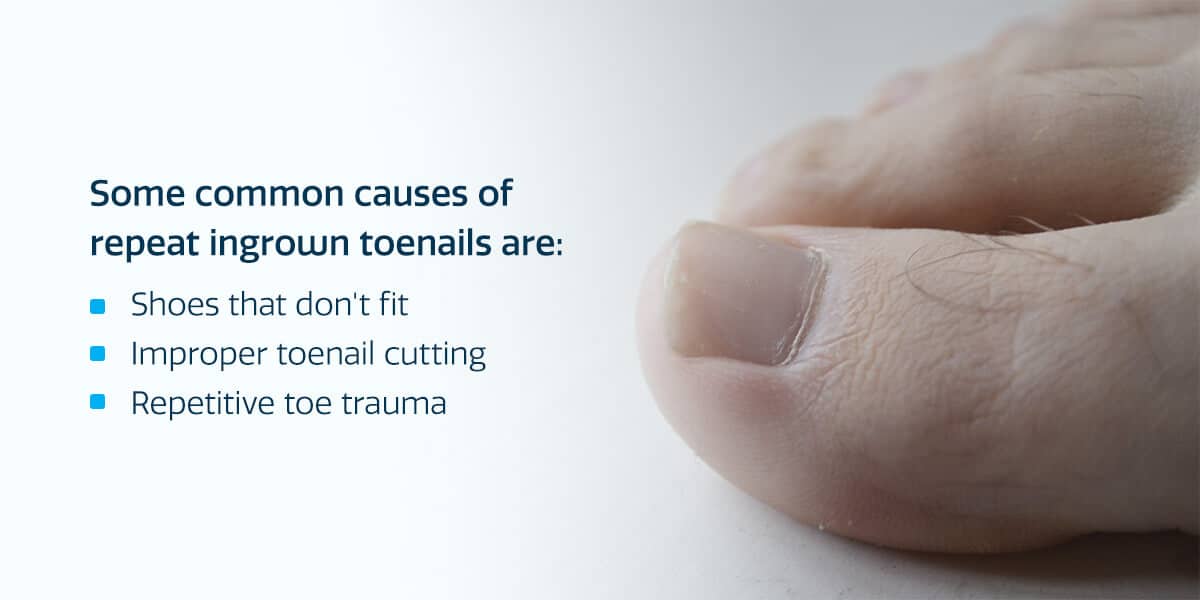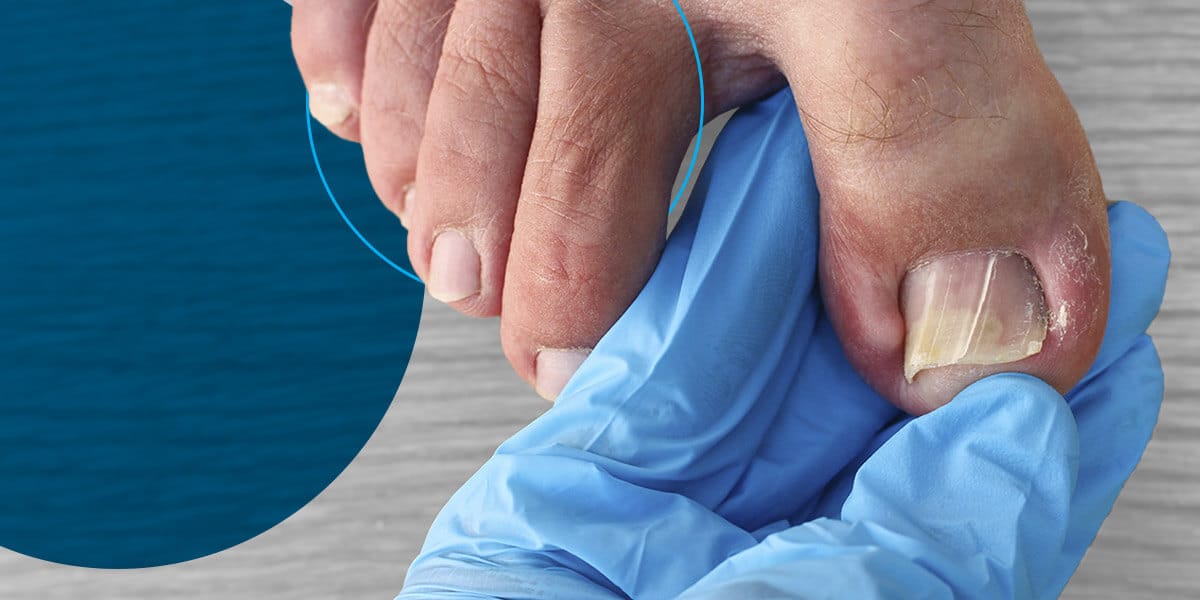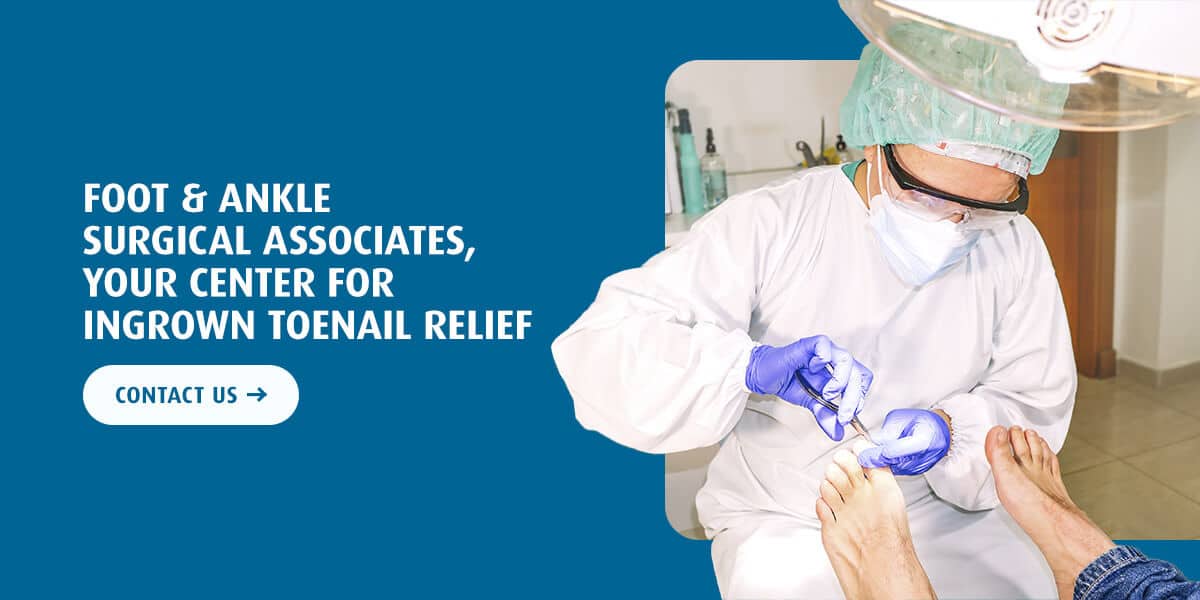Of life’s unfortunate annoyances, ingrown toenails rank somewhere on the list. Exactly where on that list they rank may largely depend on your situation.
In most cases, an ingrown toenail isn’t generally a concern. There can be a bit of pain and swelling, but you can often handle the situation from the comfort of your own home. Gently guiding the nail away from growing into the surrounding skin is key, usually by soaking the foot and using dental floss or cotton to provide a small barrier.
However, simplicity in a majority of cases doesn’t mean all ingrown toenails are no big deal — some can become a lot more troublesome. In these situations, we highly recommend that you give us a call. Leave handling your toe to a professional with the tools and expertise to offer you relief.
When to see a doctor for an ingrown toenail
If your toe is showing signs of infection, your ingrown toenail is too painful to deal with yourself, or you have ingrown toenails that keep coming back – are all signs you may need to see a podiatrist for your ingrown toenail.
If you’re still not sure, here is more information about when it’s worth contacting a podiatrist over your ingrown toenail.
1. Your Toe Is Showing Signs of Infection
While any injury can be prone to infection, injuries to the feet can be a little more susceptible. Feet face more exposure to the surrounding environment, from dust and grime that kicks up as you walk through rainy-day puddles to the insides of sweaty, dirty footwear.
If you suspect your ingrown toenail might be infected, you should have us examine it as soon as possible. If you wait and leave your toe unchecked, the situation will become worse.
The signs of infection in an ingrown toenail can include:
- Intense pain and swelling.
- Redness that radiates outward in streaks.
- Bleeding.
- Discharge of pus.
- An overgrowth of skin around the toe.
- Possible fever.
Not all symptoms have to be present to indicate an infection. You should speak with a podiatrist if you have concerns, especially if you have diabetes, as this increases the chances of your toenail not healing properly.
2. Your Ingrown Toenail Is Too Painful to Deal With Yourself
Even if you don’t believe your ingrown toenail is infected, there are still cases where the pain can be severe. If simply touching the area is painful, that’s more than enough reason to see a physician, especially since trying to treat the situation yourself can lead to additional injury.
If you’re in that much pain, the odds are higher that there’s something more going on than a simple ingrown toenail. We can provide a proper examination and treat any additional problems that might be occurring. You might even have an infection after all.
3. You Have Ingrown Toenails That Keep Coming Back
Even if your cases of ingrown toenails are minor, experiencing them frequently can signal a problem. While it’s reasonable to have one every few months, if your toe keeps having trouble over and over, something is wrong. In some cases, the cause is an external problem and relatively easy to correct.

Some common causes of repeat ingrown toenails are:
- Shoes that don’t fit: Wearing shoes that put too much pressure on your toes or force them to cram together can create frequent ingrown toenails. In this case, a simple change of footwear can work wonders.
- Improper toenail cutting: Cutting your toenails incorrectly — for example, cutting them too short or rounding the corners too much — can lead to ingrown toenails. A change in your trimming habits may do the trick.
- Repetitive toe trauma: Trauma may happen as part of running in shoes that slide around on your feet. Changing your footwear or exercise habits may be effective in this case.
You often only need to make a small change to relieve your ingrown toenails. However, there’s a possibility that the problem may be hereditary rather than external. Some people are simply born with nails that tend to grow inward. If you know your parents or relatives deal with frequent ingrown toenails, this might also be the case for you.
Whether the issue is internal or external, if you’re experiencing persistent ingrown toenails, we encourage you to reach out to a podiatrist to resolve the issue the right way.
How Can Doctors Help an Ingrown Toenail?
If your ingrown toenail requires attention from a podiatrist, you can expect them to treat you using a few different methods.
The two most common treatment options are to numb the toe and cut away part of the nail or use a splint to elevate the nail from the skin. The podiatrist may also prescribe antibiotics or a toe brace. If your doctor determines your ingrown toenail is due to fungus, they’ll prescribe specific measures for treating it and relieving your toenail.
When external changes or other mild treatments don’t stop ingrown toenails from coming back, your podiatrist might consider the more permanent solution of removing part or all of the nail. Once they’ve removed the nail, they can treat the nailbed to prevent a new nail from growing in.
We can perform this procedure in any of our offices under local anesthesia. You should rest your foot and limit activity for one to two days following the procedure, but recovery is relatively quick compared to other surgeries. After this treatment, you won’t have to deal with ingrown toenails on that toe again.
Each situation is different and requires individualized treatment methods. Speak with your podiatrist to learn more about how they may fix your ingrown toenail.
Your Center for Ingrown Toenail Relief
If an ingrown toenail is causing you more than a small amount of trouble, please don’t hesitate to give us a call at Foot & Ankle Surgical Associates. Whether your case falls neatly into any of the above categories or not, your concerns are valid and we’d love to hear from you!
Our team of podiatry experts can help ensure the problem is treated without any further pain or complications, allowing you to get on living with one less bother in the way. We have offices in Tumwater, Tacoma, Olympia, Centralia and Lacey. Call us at 360-754-3338 to schedule an appointment at any of them or fill out our contact form.






